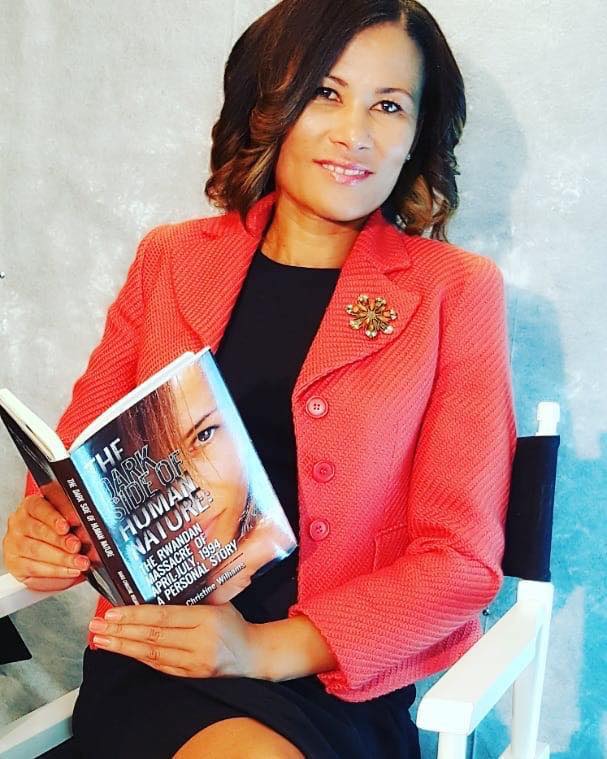“You can choose courage in the face of terror, faith and hope instead of despair, and light to triumph over darkness.” – Marie-Christine Williams

It’s hard to believe that the massacre in Rwanda happened a quarter of a century ago! Most people heard about it, but many may not have totally understood it.
Now, Marie-Christine Williams, who survived the atrocities, is sharing her story through her book, “The Dark Side of Human Nature: The Rwandan Massacre of April-July, 1994, A Personal Story” and a speaking engagement at the Missouri History Museum to help people more fully understand. Through her personal account of survival, she also explores the nature of forgiveness and the healing power of compassion and service to others.
The museum, in collaboration with Bilingual International Assistant Services, Purposed Productions, and the Holocaust Museum & Learning Center – St. Louis, will host the program, “Triumph Over Darkness” at 7 p.m., Wednesday, June 26, in the Missouri History Museum’s Lee Auditorium.
 There, Williams, who is now a St. Louis resident, a speaker, author, and founder of MCW Hope for Life, will give her account of surviving one of the worst genocides in history, as well as her recovery and life since then. The event marks the annual UN Day in Support of Victims of Torture and the 25th anniversary of the Rwanda genocide of 1994.
There, Williams, who is now a St. Louis resident, a speaker, author, and founder of MCW Hope for Life, will give her account of surviving one of the worst genocides in history, as well as her recovery and life since then. The event marks the annual UN Day in Support of Victims of Torture and the 25th anniversary of the Rwanda genocide of 1994.
In 1994, Williams was a mere 14 years old, living in her father’s house in Kigali, Rwanda, when the Rwandan genocide began.
She happened to be in the backyard when a death squad burst into her family’s home. Hiding in the bushes, she listened in horror as her family members were attacked with machetes. Finally, when the screaming stopped, she fled – frightened, barefoot and alone.
So begins her harrowing account of surviving the 100-day bloodbath that took as many as 1 million lives. During the genocide, extremist members of the ethnic Hutu majority turned against the Tutsi minority and moderate Hutu. When it was over, it is estimated that 80% of Rwanda’s Tutsi population had been slaughtered.
But Williams survived. She used her wits, faith in God, and sheer determination to overcome injury, attempted murder, starvation and the emotional trauma of witnessing so many brutal killings. She ran at night and hid during the day. Her only focus was eluding the death squads on patrol and evading the roadblocks where the killers executed anyone suspected of being Tutsi.
As a mixed-race “blended” child, she was at an even greater risk of death. Her father was a black Tutsi who converted to Catholicism. Her European mother’s parents were white Holocaust survivors from Romania.
Twice Williams was captured. Twice she escaped. The third time, her captors dragged her to a bridge with other women, hacked them with a machete, and pushed them over the side, and left them for dead. She was later pulled from the pile of bodies by rebel soldiers of the Rwandan Patriotic Front, saving her life.

It has taken over 20 surgeries and years of healing to recover from the trauma that she experienced. Her emotional and spiritual recovery continues. With the support of her surviving family, friends, physicians and teachers, she was able to turn away from despair. She returned to church. She married, gave birth to a son, and she and her husband built the warm and happy home that she had always wanted.
Today, she is a widowed single mother, a successful author and a compelling, inspiring motivational speaker. She lives in St. Louis, the home of her late husband’s family.
In 2018, Williams started the nonprofit organization, MCW Hope for Life, through which she brings people together to bring hope to those hurting locally and internationally by collecting money, clothes, and providing resources for sick and dying children and their families.
The program will begin with a reception at 6:30 p.m. at the Missouri History Museum. Light refreshments will be provided, and attendees can examine timelines and images that provide context for the events in Rwanda, as well as information on how the country has changed since the genocide. The presentation starts at 7 p.m. and will be followed by a Q&A session with Williams, who will also be on hand to sign copies of her book, which will be available for purchase. The program is free and open to the public. Visit triumphoverdarkness.com for more information.
The Missouri History Museum is located in St. Louis’ Forest Park, and is operated by the Missouri Historical Society. The museum offers programs and outreach services, including special exhibits; tours, theatrical and musical presentations, programs for school classes and youth groups, family festivals, special events, workshops and lectures. Learn more at mohistory.org/museum.
Bilingual International Assistant Services was founded in St. Louis in 2002 by stateless refugee women to address the difficulties of foreign-born communities in accessing health and social services, and serves over 3,200 clients per year. For more information, visit bilingualstl.org.
The Holocaust Museum & Learning Center preserves the legacy of the Holocaust, educates about its causes and empowers visitors to make the world a more tolerant place by rejecting all forms of hate, racism and bigotry. Visit hmlc.org.
